50 Tips for Sleeping Better Tonight, According to Experts
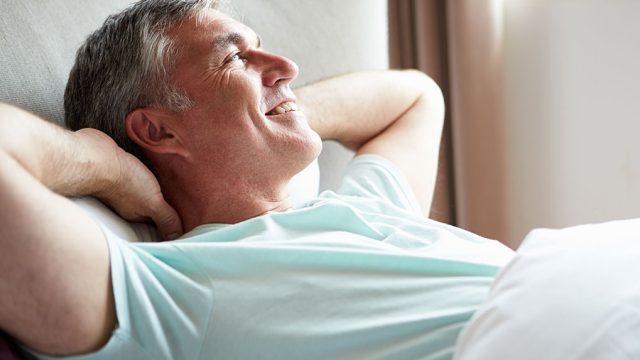
Chances are high you feel far from well-rested when you wake up every morning. After all, more than a third of Americans aren’t getting enough sleep these days, according to the Centers for Disease Control and Prevention (CDC). And that comes at a price. People who don’t get enough shut-eye feel the unpleasant—and sometimes serious—effects of fatigue, including extreme irritability, weight gain, short-term memory loss, heart disease, and Alzheimer’s. But what if we told you that you don’t have to feel sleep-deprived any longer and that you could reduce all of those aforementioned risks starting now? From the beverages you drink (get ready to fill up on cherry juice), to the ideal temperature in your bedroom, to blowing bubbles (yes, really), keep reading for 50 amazing sleep tips, backed by doctors and science. Get ready to start sleeping better tonight and feeling better tomorrow!
1
Try sleeping on your side.
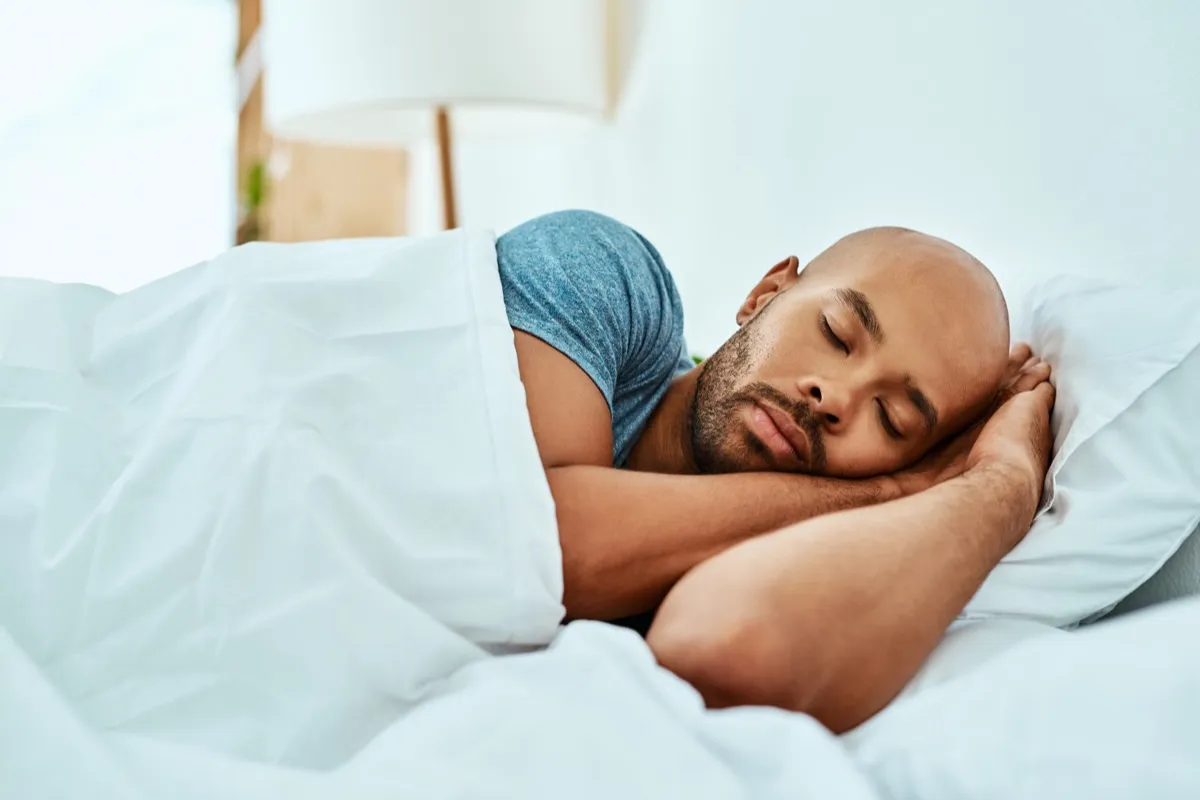
According to the Better Sleep Council, there are three main sleep positions: back, stomach, and side. Each has its pluses and minuses, but the best one for insomnia is your side. “Sleep specialists recommend sleeping on your side in order to rest more comfortably and decrease the likelihood of interrupted sleep,” writes sleep expert and educator Terry Cralle, MS, RN, on the Better Sleep Council website. “While there are many variations of sleeping on your side, all of which are beneficial in helping to alleviate insomnia and chronic sleep deprivation, the most comfortable position involves bending the knees slightly upward toward the chest.”
2
Invest in extra pillows to relieve back pain.
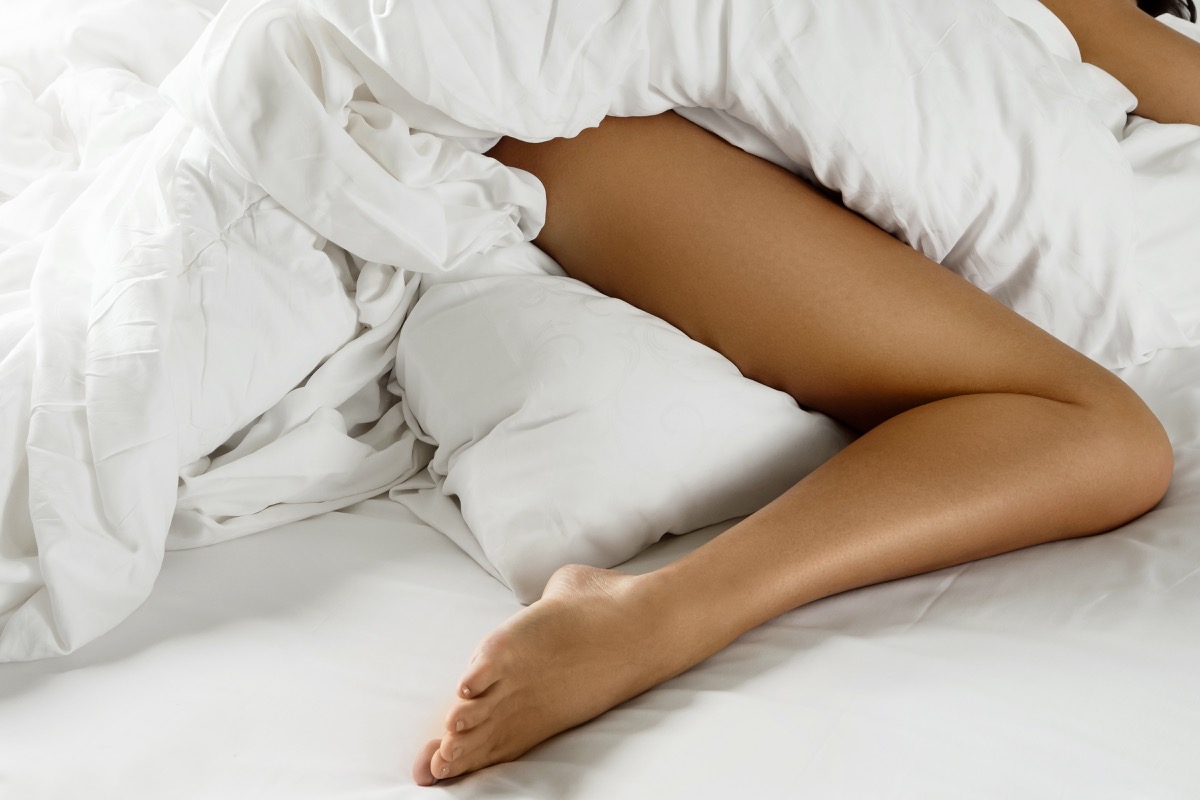
When your back is aching, how can you be expected to sleep well? If you want to alleviate that stress, situate a pillow between your legs, while lying on your side. “Putting a pillow between your legs can be quite helpful,” writes chiropractor Dr. R.J. Burr on the Start Sleeping website. “However, if it doesn’t help, try placing that pillow or an extra pillow under your abdomen between your ribs and pelvis. When you lie on your side, your abdomen caves in or side flexes downward, placing your spine out of ideal alignment. The pillow simply buttresses the flank, supporting the spine in a better position, where the pillow between the legs doesn’t.”
3
Go to sleep at the same time every night.
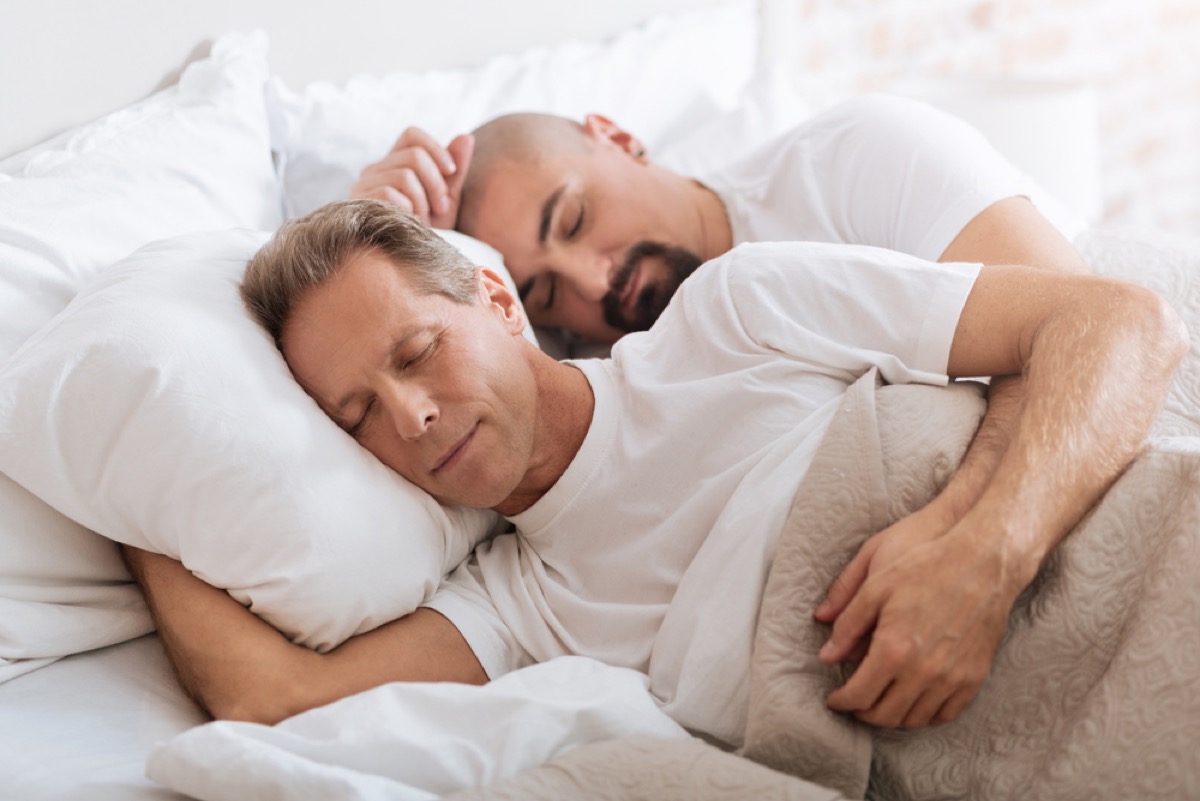
Last-minute emergencies and late nights at the office tend to get in the way of your routine, but if you want to ensure that you’re getting restful slumber every night, you should do your best to stick to a schedule. In a 2010 study published in the journal Sleep, researchers concluded that participants who had stable and predictable routines took less time to fall asleep, had improved sleep quality, and slept more efficiently. And the first step in establishing a solid sleep routine is going to bed at the same time every night.
4
Use an alarm to signify bedtime.
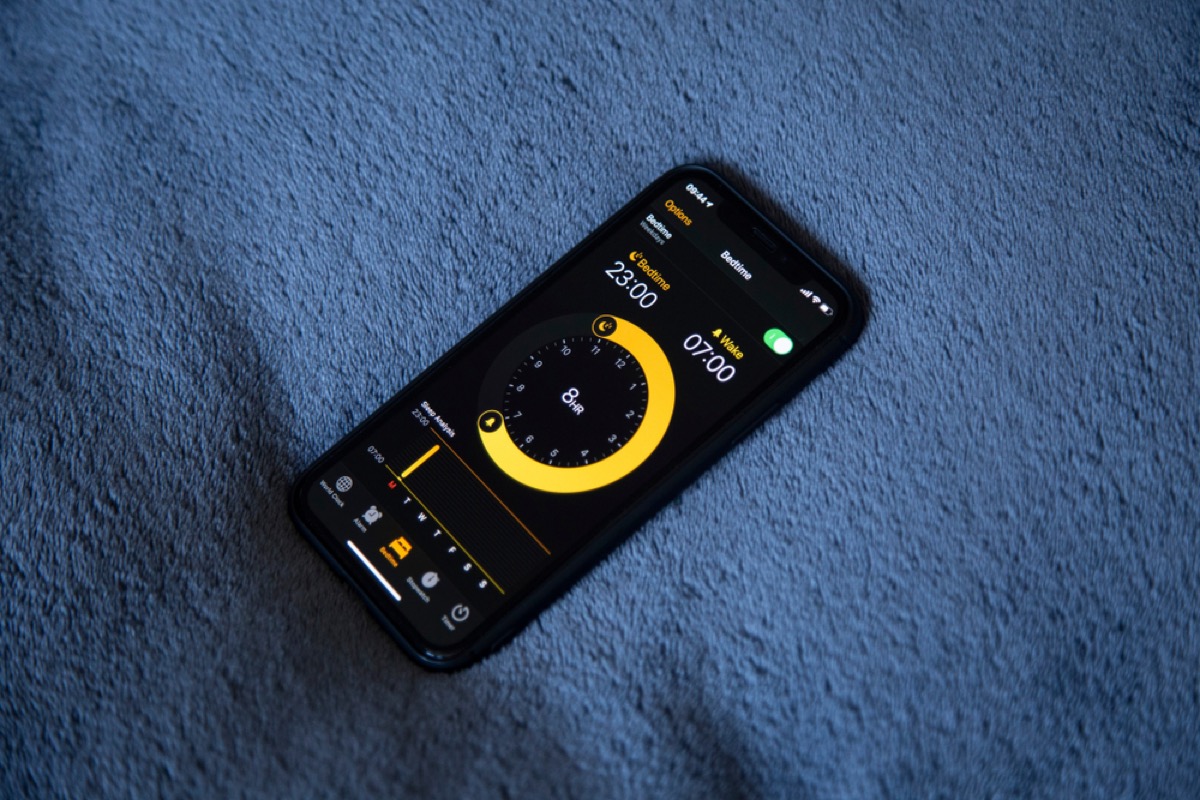
Need help doing that? Set an alarm! Whether you do so on your smartphone, through your FitBit, or by downloading a specific sleep timer app, having an alarm go off at, say, 10 p.m. is a really great way to remind you to wind down at the same time every night. Once the alarm goes off, start adhering to your nighttime routine. And if you’re an iPhone user, there’s a built-in element of your alarm settings called “Bedtime” that can help you out. “I think it’s a great idea,” sleep specialist W. Christopher Winter, MD, told Shape of the feature.”It goes back to the idea of mindfulness.”
5
Wake up at the same time every morning (yes, even on weekends).

As we mentioned, the best thing you can do for yourself is create a sleep routine and stick to it. That means going to bed at the same time every night and waking up at the same time every morning. Adhering to a strict sleep schedule is important seven days a week. If you have to wake up every weekday at 6 a.m. for work, but you sleep in until 9 a.m. on the weekends, that’s going to disrupt your sleep-wake pattern (AKA your circadian rhythm).
6
Turn your alarm clock away from you.
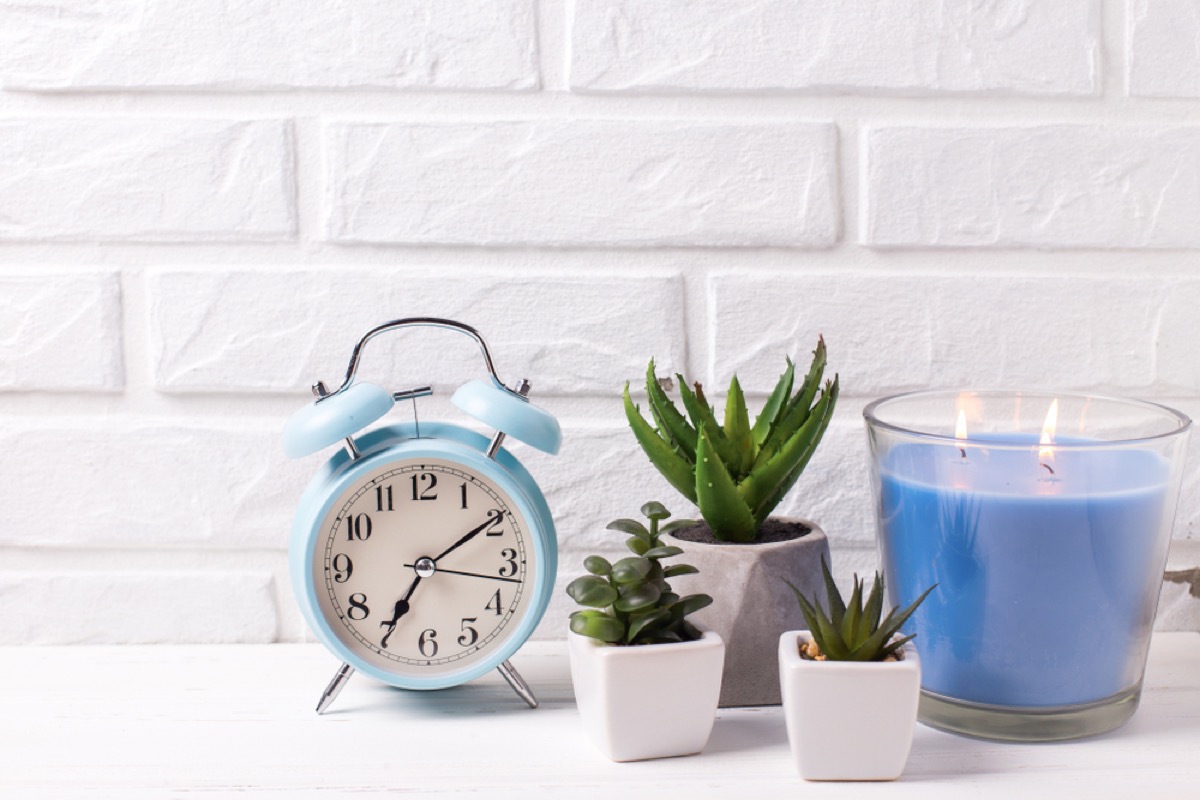
When you’re having difficulty falling asleep, staring at the clock only makes it worse. “It increases your stress and worry about not falling asleep,” Lisa Meltzer, an education scholar for the National Sleep Foundation, explained to HuffPost. So, she suggests turning your alarm clock away from you. If you can’t watch the minutes go by, you’ll have a much easier time de-stressing and soothing yourself to sleep.
7
Avoid spicy food at night.

Though eating spicy food doesn’t necessarily give you nightmares, as an old wives’ tale claims, you still should stay away from too much cayenne pepper in your dinner. A landmark 1992 study published in the International Journal of Psychophysiology had six young, healthy male subjects include tabasco sauce and mustard in their dinners and then measured their sleep patterns. The spiciness, it turns out, “markedly disturbed” their rest, reducing the quality of their sleep, increasing their total time awake, and increasing the time it took for them to reach REM sleep, the restorative phase of sleep that helps us store memories and even learn new information. Plus, the spicy food also elevated their internal body temperatures, which is known to prevent one’s ability to fall sleep.
8
Eat more fish.

In a 2017 study, researchers from the University of Pennsylvania found that eating fish can promote better, more restful sleep. That’s because fish contains high levels of omega-3 fatty acids, which are believed to increase the production of the sleep-regulating hormone melatonin. If you can’t stomach the flavor of fish, spring for some omega-3 capsules instead.
9
Crack a window.
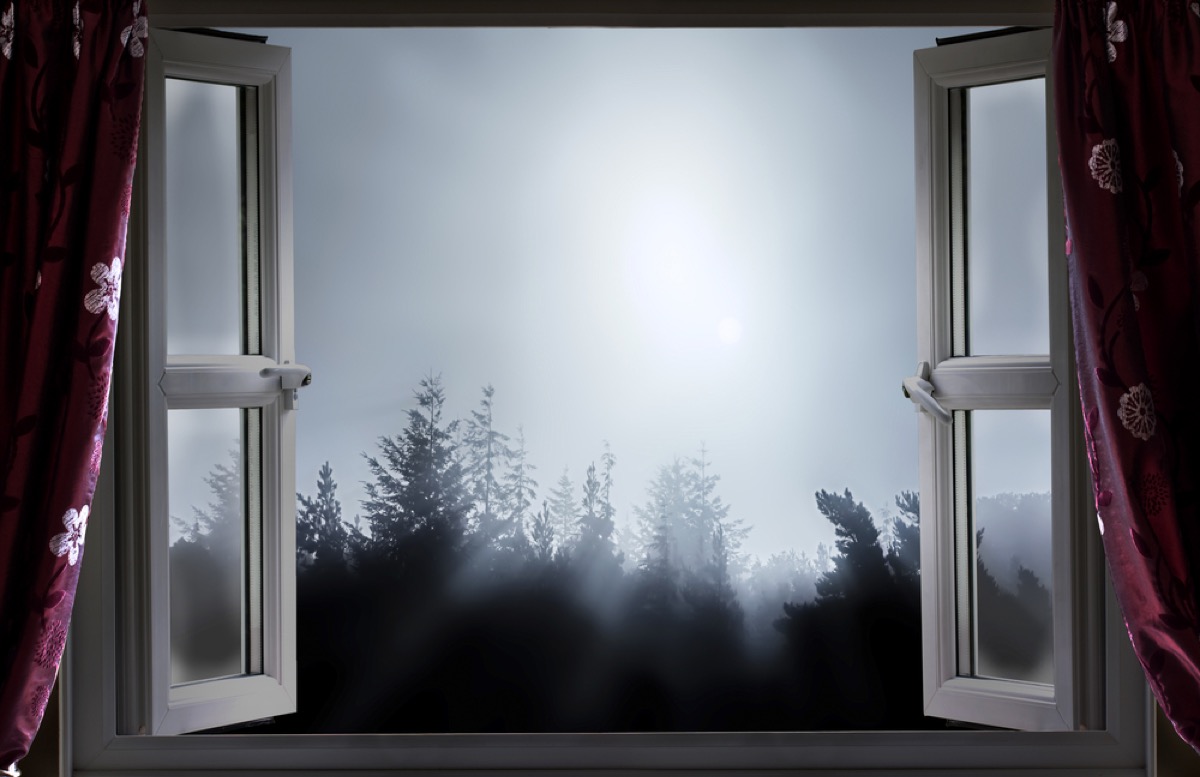
If you’ve been sleeping restlessly with your windows shut, you might want to consider propping a few open. In 2018, researchers from Eindhoven University of Technology found that leaving either a door or a window open promotes air flow and reduces levels of carbon dioxide, a known sleep inhibitor.
10
Hop in the shower.

Another way to lower your body’s core temperature (and fall asleep faster) is by taking a shower right before bed. Even if you bathe in warmer water, your core body temperature will decrease once you step out of the shower into the cool air and dry off.
11
Blow some bubbles.

Sure, it might feel silly in the moment, but Rachel E. Salas, MD, an associate professor in the Department of Neurology at Johns Hopkins, swears by this method for falling asleep. As she explained in an interview with the school’s Brain Science Institute, blowing bubbles has a relaxing effect, particularly “when the brain sees the bubble go off and disappear or pop. … You visually see something kind of released out of you.”
12
Go for a walk.

Active people tend to report getting a better night’s sleep than those who aren’t out and about, according to a 2013 National Sleep Foundation poll. But that doesn’t mean you have to do serious cardio. “If you are inactive, adding a 10-minute walk every day could improve your likelihood of a good night’s sleep,” Max Hirshkowitz, PhD, who led the poll, said in a statement. “Making this small change and gradually working your way up to more intense activities, like running or swimming, could help you sleep better.”
13
Write a to-do list before you sleep.
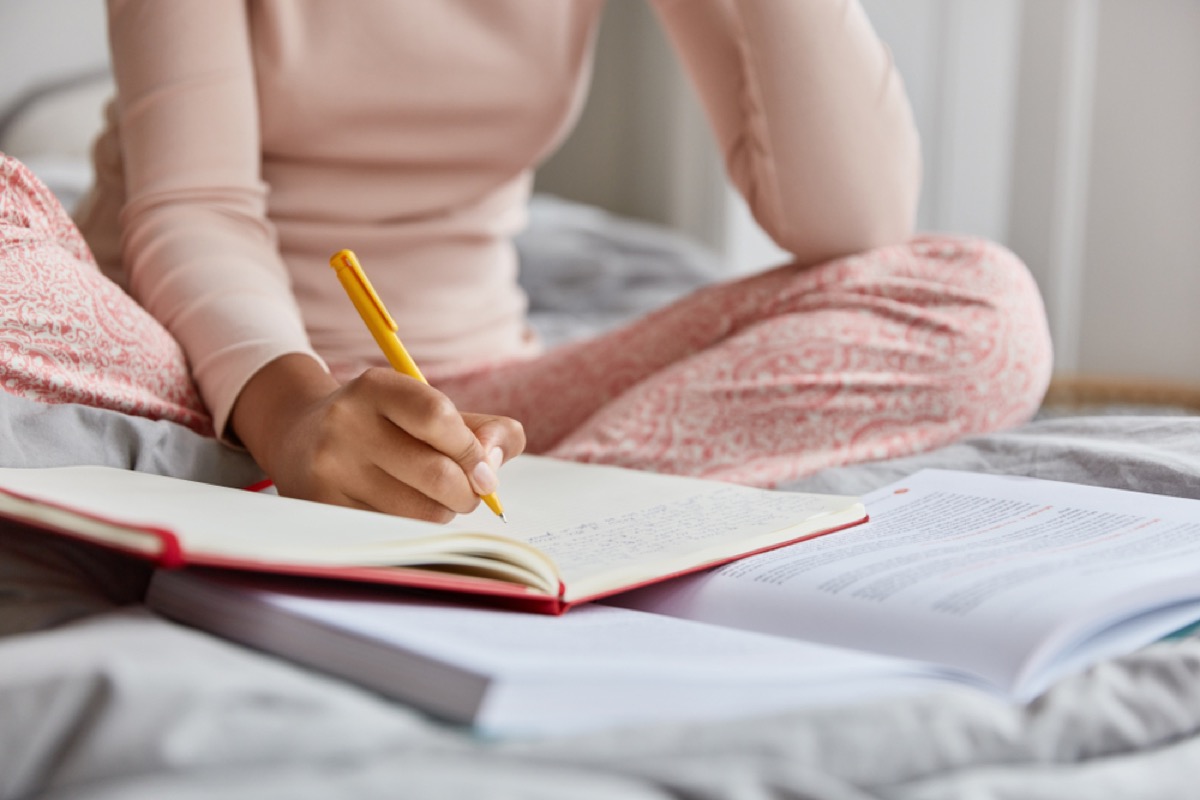
When you think about what helps you relax, the last thing that probably comes to mind is writing a to-do list. But, according to a 2018 study in the Journal of Experimental Psychology, writing your to-dos down before bed can help you get to sleep faster. By getting all of your impending thoughts out at once, the thinking goes, you won’t waste any time hemming and hawing in the wee hours of the morning.
14
Turn down the thermostat.

Experience might indicate that heat begets sleep; we’ve all dozed off in a toasty boardroom or lecture hall, after all. However, since your internal temperature drops a few degrees at the onset of sleep, you can help your body drift off to dreamland simply by lowering the temperature in your room. The ideal temperature? Between 60 and 67 degrees Fahrenheit, according to The National Sleep Foundation.
15
Limit your coffee intake.

In the morning, drinking a cup of coffee is a great way to start the day with a jolt of energy. At night, though, indulging in the bitter beverage is a bad idea—because when you finally do want to wind down, that coffee is going to make it especially difficult to do so.
In 2013, researchers from Wayne State College of Medicine compared the sleep disruptiveness of consuming 400 milligrams of caffeine (which is what’s in your typical 16-ounce cup of coffee) at three different times: right before bedtime, three hours before bedtime, and six hours before bedtime. It turns out, even subjects who had their final cup of coffee six hours before going to sleep experienced sleep disturbances.
16
Cut back on smoking.
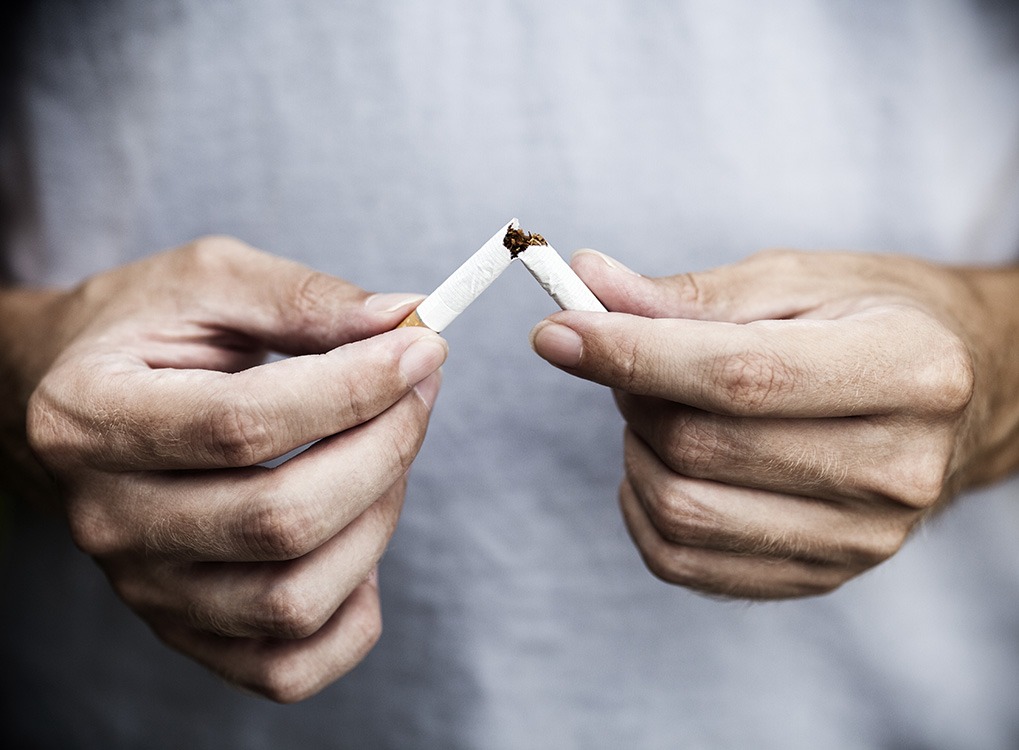
Nicotine, like caffeine, is a stimulant, so it exacerbates insomnia and keeps you awake even longer. A 2009 study published in the Sleep Medical Review found that trouble falling asleep, fragmented sleep, and increased daytime drowsiness were all observed in subjects who use nicotine.
17
Skip the nightcap.

Sure, alcohol tends to lead to drowsiness, but when you’re under the influence, you’re more likely to wake up throughout the night. “Alcohol is a depressant, which can help somebody feel like it’s relaxing them and helping them to fall asleep,” Charlene Gamaldo, MD, explained to Everyday Health. “But alcohol also is rapidly metabolized in your system and, when your body washes the alcohol out, it’s more likely to cause what we call a rebound alertness.” And unfortunately, that rebound alertness is precisely what disrupts our REM sleep.
18
Use a weighted blanket.
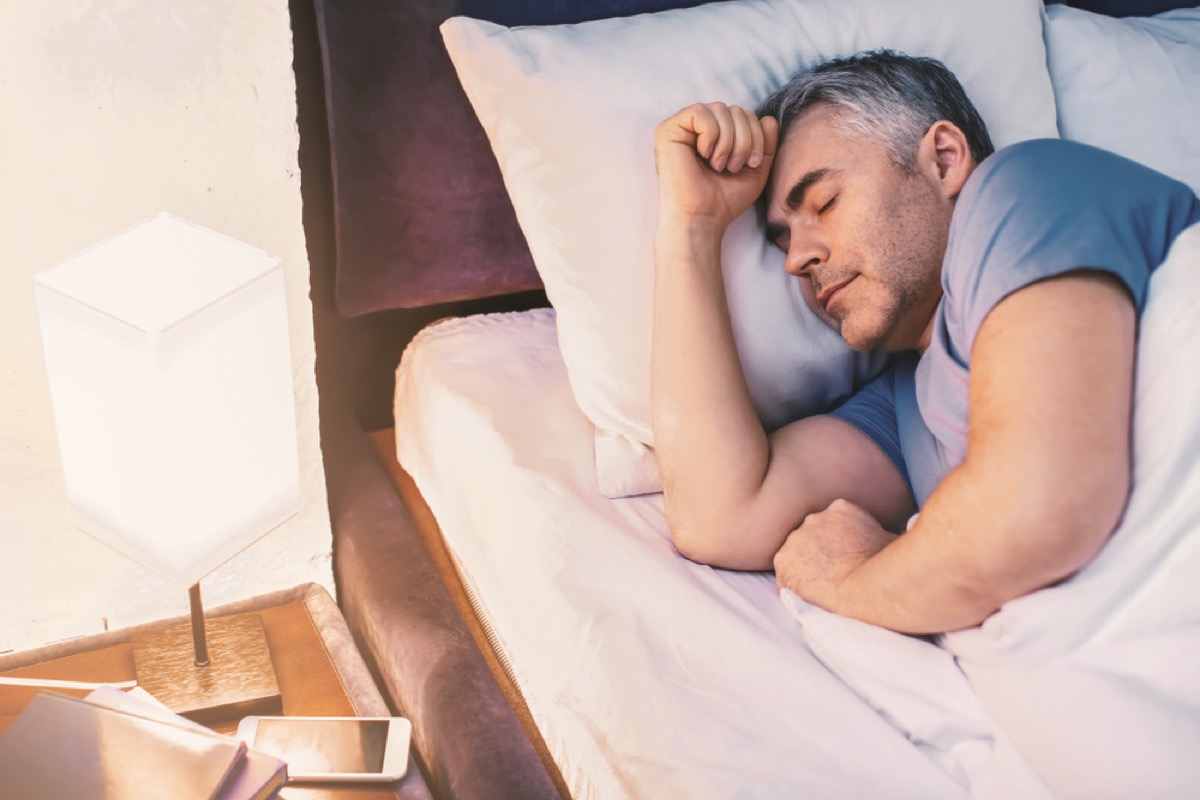
There’s a reason why weighted blankets are all the rage nowadays. As one 2006 study published in Occupational Therapy and Mental Health explains, these blankets promote better sleep by imitating the feeling babies experience while being swaddled. An impressive 63 percent of study participants reported lower anxiety after using one.
19
Avoid taking certain pain relievers.
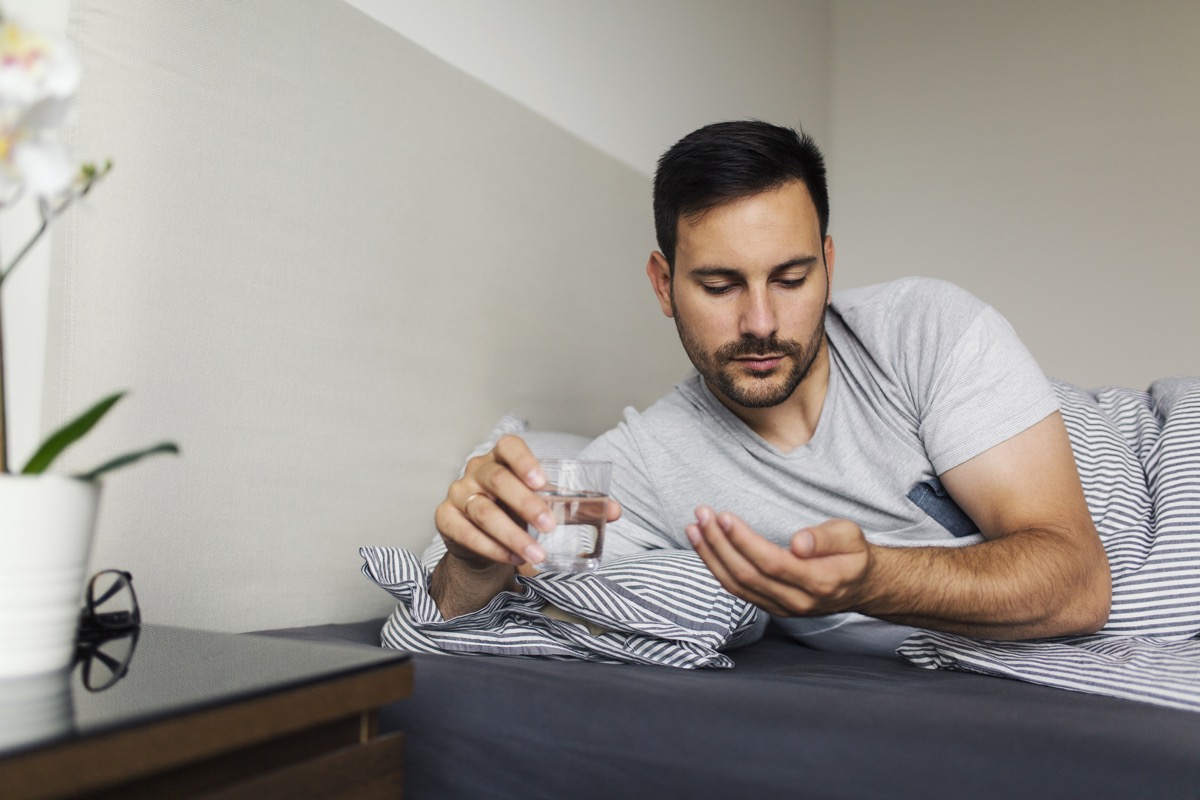
Coffee isn’t the only substance that contains energizing caffeine. Some pain relievers—like as Excedrin Migraine and Midol—pack it in their pills, too. So, if you’re taking something to banish pain before bed, make sure to read the label and avoid accidentally ingesting an invigorating dose of caffeine.
20
Get a white noise machine.
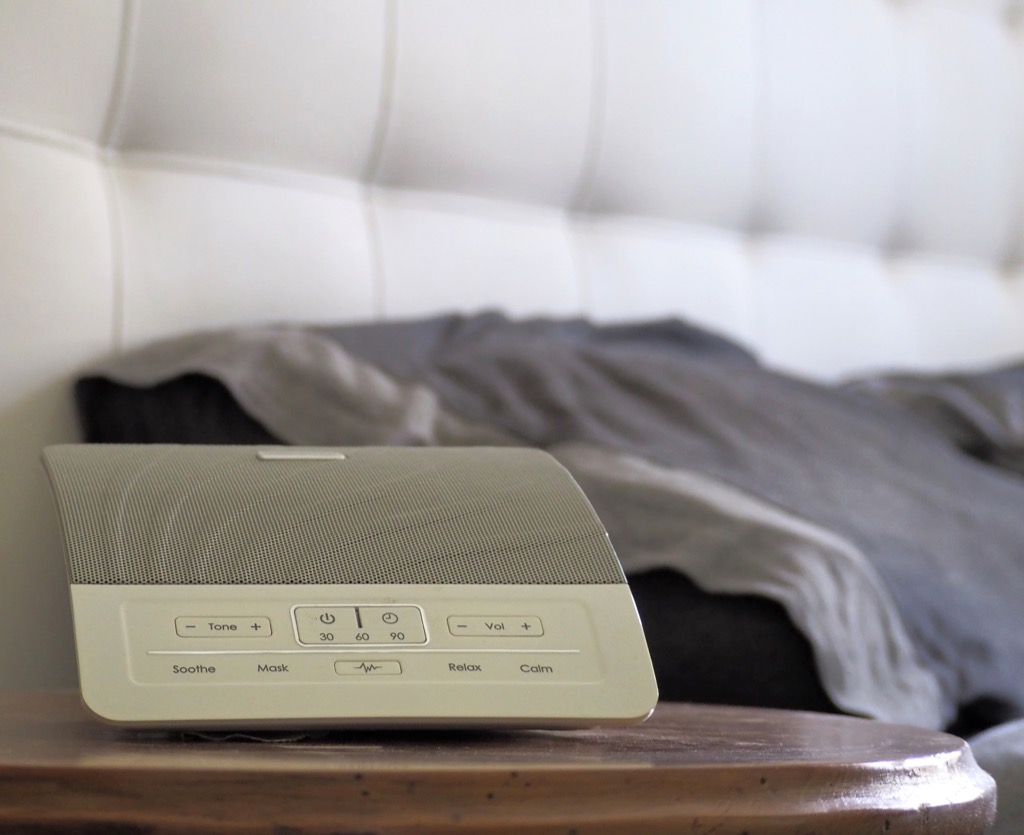
White noise machines can make falling asleep and staying asleep so much easier. In a 2005 study published in the journal Sleep Medicine, researchers split participants into two groups, those who sleep with white noise machines and those who don’t, and then exposed them to recorded hospital sounds. Through analysis of the subjects’ brain waves, the researchers found that those who slept with white noise machines were hardly disturbed by the ICU sounds, while those who slept without one experienced frequent sleep arousals.
21
Don’t sleep with your hair up.
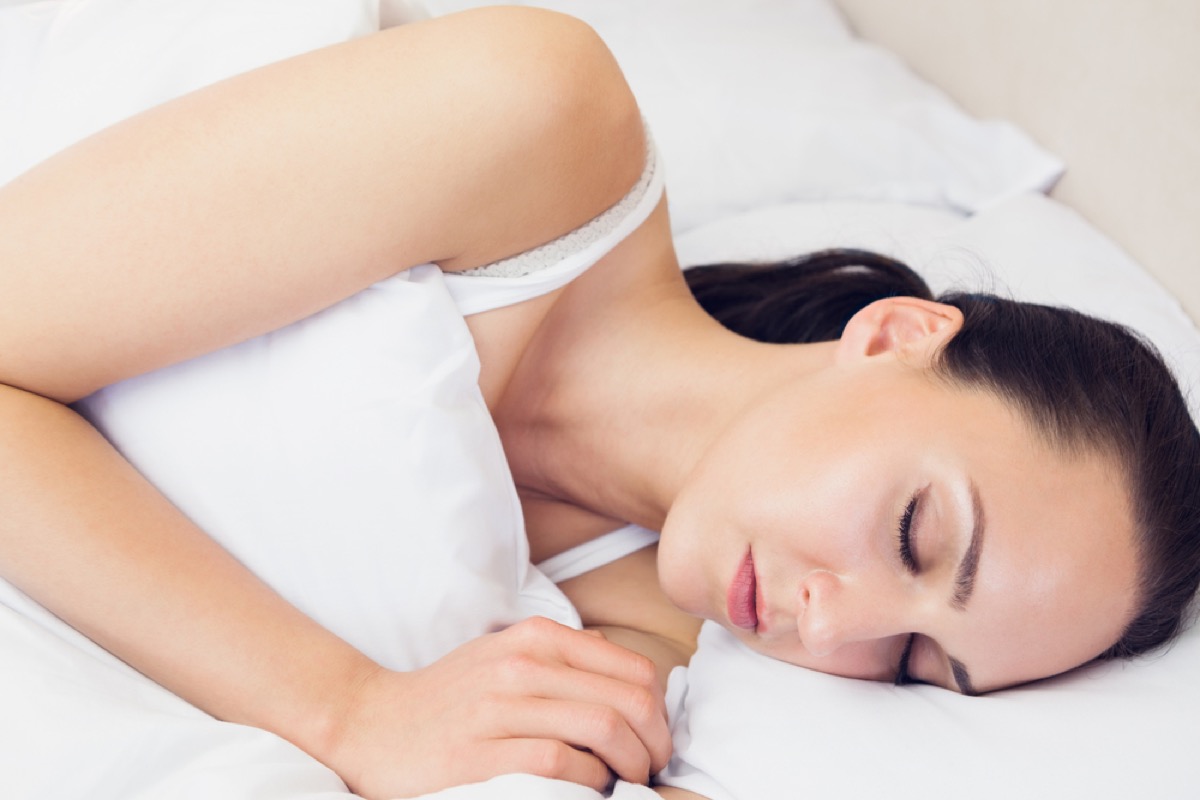
Especially if you are prone to headaches and migraines, sleeping with your hair tied up isn’t a good idea. Experts specifically suggest avoiding tying your hair up in the center of your head (as in, a messy bun or a tight ponytail). If you want it out of your face while you sleep, a low, loose pony is your best bet. “As long as the style does not place traction on roots, meaning it doesn’t pull too tight or ‘hurt’ the next morning, it should be fine,” Francesca J. Fusco, a New York City-based dermatologist, told Allure.
22
Drink cherry juice.

Tart cherry juice contains sleep-inducing chemicals like procyanidins and anthocyanins, so it could just be the key to tacking on some necessary minutes to your REM sleep cycle. In fact, a 2018 study in the American Journal of Therapeutics found that drinking cherry juice before bed helped subjects add an average of 84 minutes to their sleep.
23
But stop drinking at least two hours before bed.

One thing that’s sure to keep you up all night is the recurrent urge to go to the bathroom. To nip that problem right in the bud, cease drinking all liquids—yes, cherry juice included—two hours before you go to bed, according to Courtenay Moore, MD, of the Cleveland Clinic.
24
Snack on foods like nuts and salmon jerky.

What do these foods have in common? They both contain the amino acid tryptophan, which has been shown to induce drowsiness, as a landmark 1982 study published in the Journal of Psychiatric Research found.
25
But avoid a late-night protein snack.
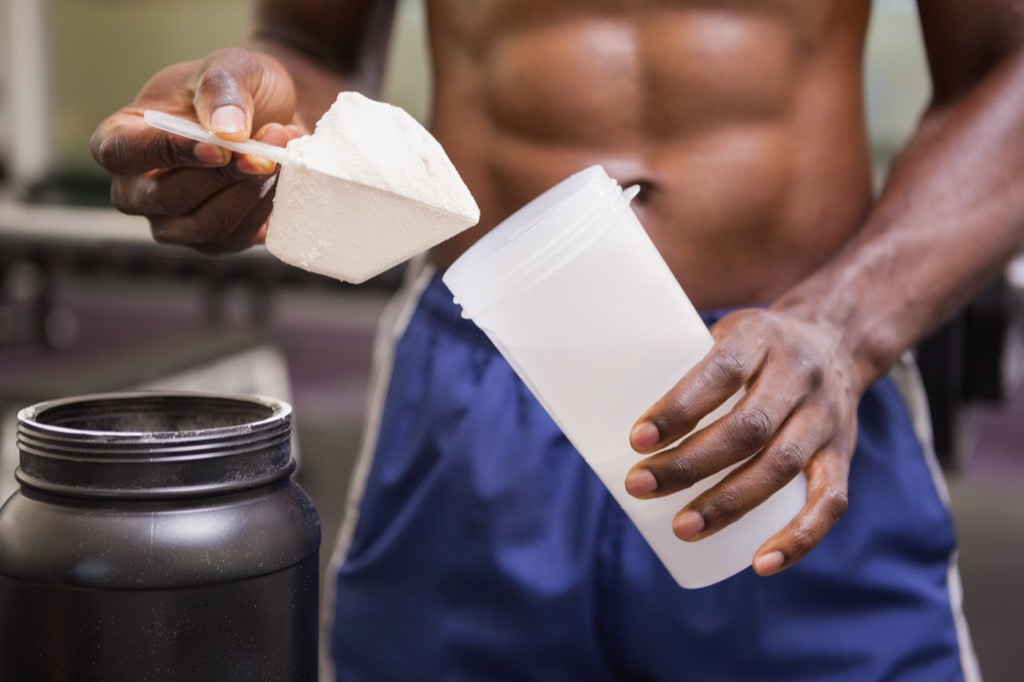
Late-night meals high in protein might be affecting your sleep, as protein reduces the amount of serotonin—the amino acid that helps you fall asleep—your body makes, according to WebMD. Protein is also more difficult for you to digest, so you’re causing your body to work overtime while it’s resting, which understandably keeps you up at night.
26
Eat a banana.

You’ve heard time and again that eating before bed is a bad idea—it boosts your blood sugar, it makes you gain weight, it keeps you awake, and so on. But in reality, if you eat the right food—namely, a banana—a little snack before you hit the sack is totally fine. Research out of Airlangga University in Indonesia in 2017 found that elderly folks who ate a banana or two before bed were able to fall asleep faster than those who didn’t.
27
Spend some time in the dark.
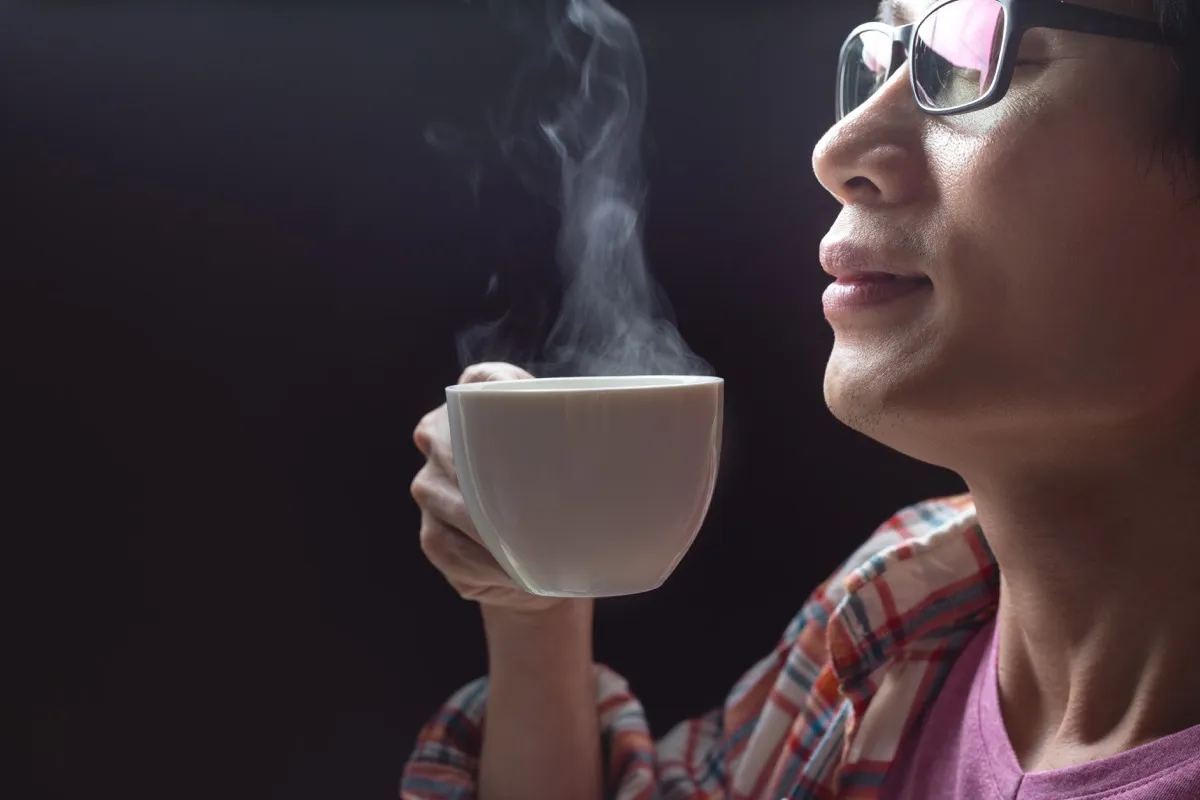
Be careful about how much time you spend sitting in bright rooms before bed. One 2011 study published in The Journal of Clinical Endocrinology & Metabolism found that when subjects were exposed to light in the 8 hours before bed, 99 percent of them saw a delayed release of melatonin, making it more difficult to fall asleep.
28
Don’t sleep with your pet.
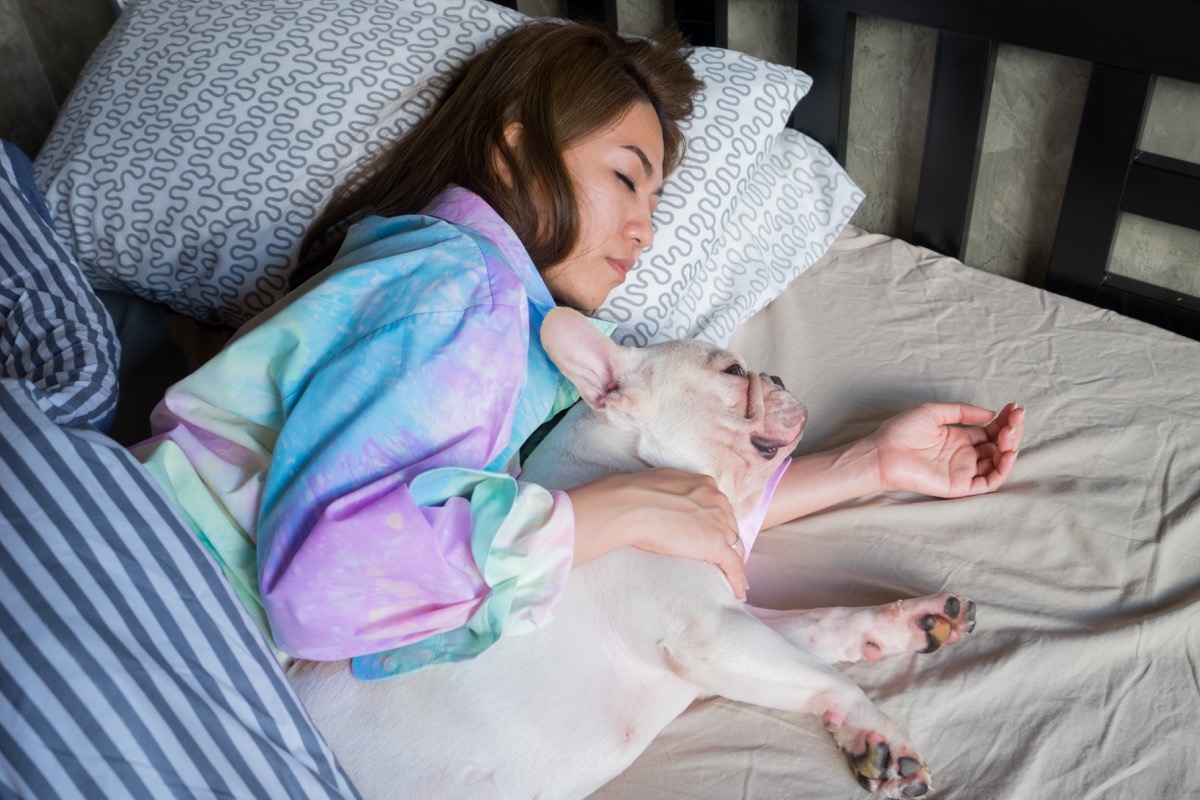
We know you love cuddling with Fido, but having your pup in bed isn’t ideal when it comes to your sleep patterns. When researchers at the Mayo Clinic observed dog owners for five months in a 2017 study, they found that those who let their animals sleep in the bed with them woke up more often throughout the night. But that doesn’t mean your pup can’t be nearby: The same study found that pet owners got satisfactory sleep when their pets were in the bedroom, just not on the bed.
29
Go to the gym.

An easy way to simultaneously sculpt your body and ensure that you sleep better is by going to the gym more. One 2018 study published in the journal Sleep found that a person’s activity levels were directly correlated to their sleep quality.
30
But avoid intense training before bed.
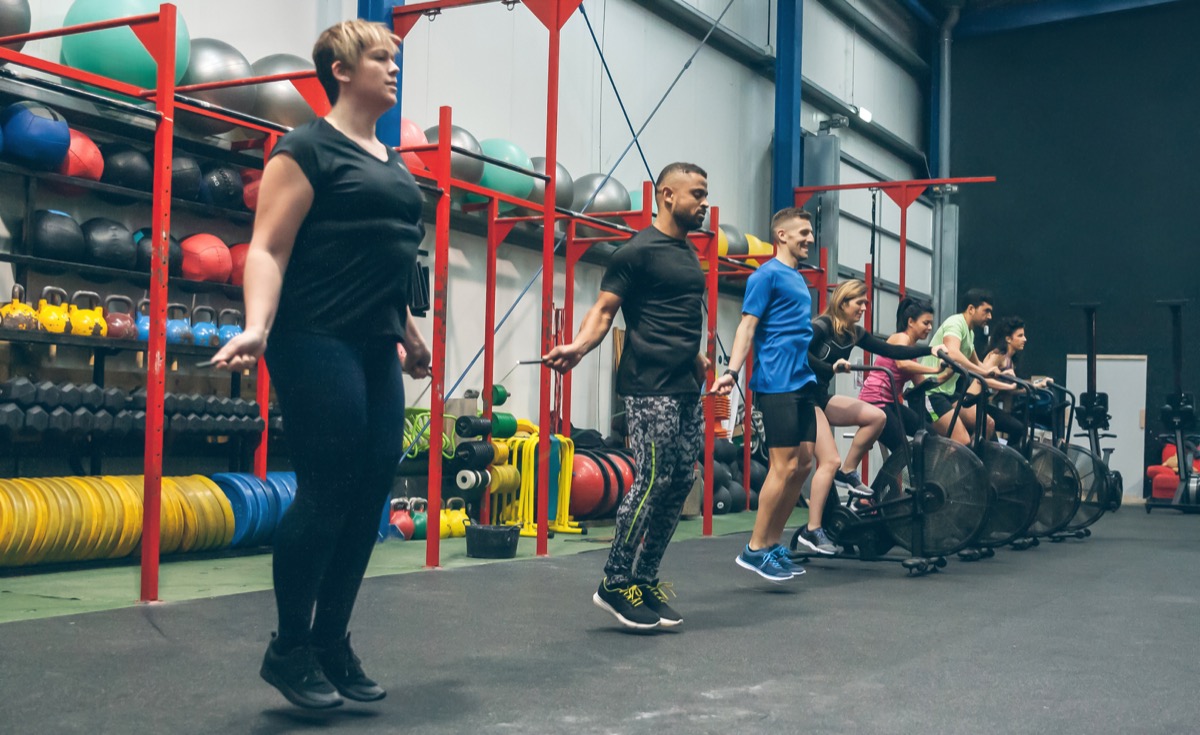
That being said, if your main goal is to feel more rested and relaxed at the end of the day, there is one type of workout you should avoid doing too close to bedtime: vigorous training. When researchers from the Institute of Human Movement Sciences and Sport at ETH Zurich analyzed data on how working out before bed affects sleeping patterns in 2018, they concluded that any type of exercise during which a person is unable to speak because they are so out of breath can make it more difficult to fall asleep.
31
Meditate.
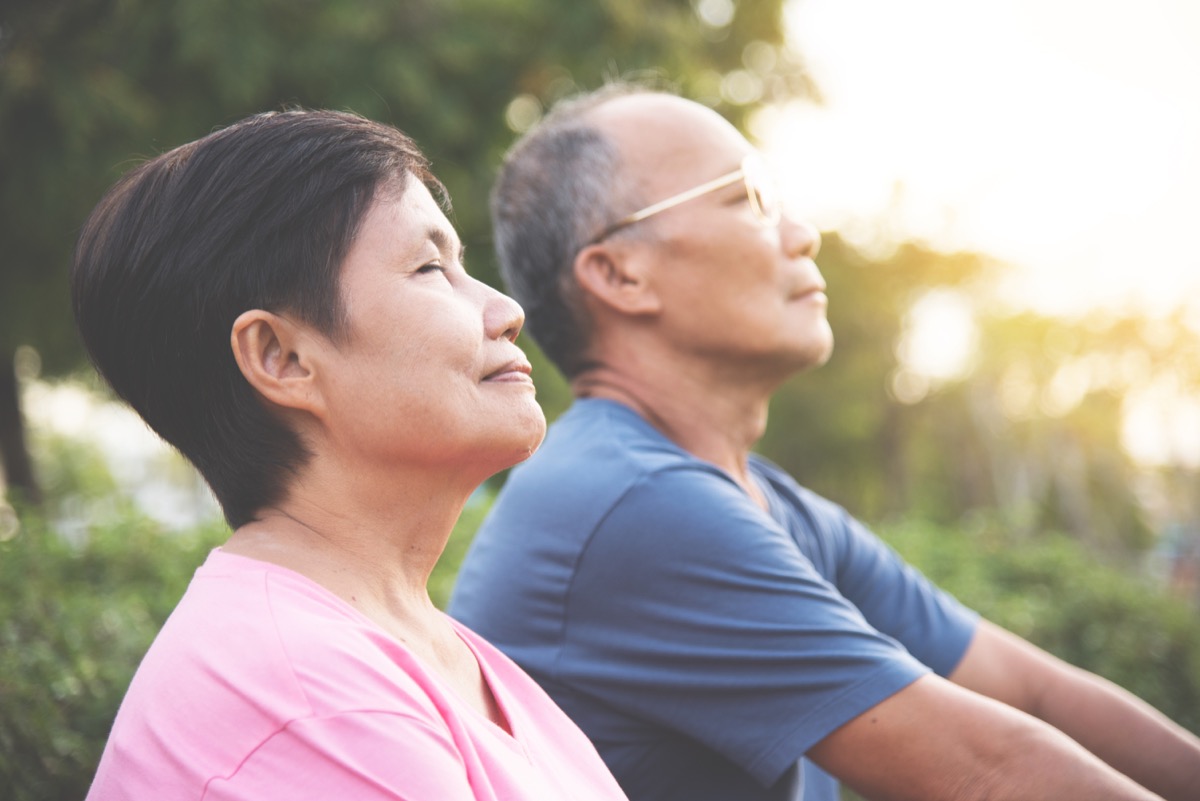
Meditation can have some serious sleep-inducing benefits. In one 2015 study published in JAMA Internal Medicine, researchers found that subjects who participated in mindfulness-based practices experienced fewer sleep-related problems, fewer symptoms of insomnia, and were less tired.
32
Take a yoga class.
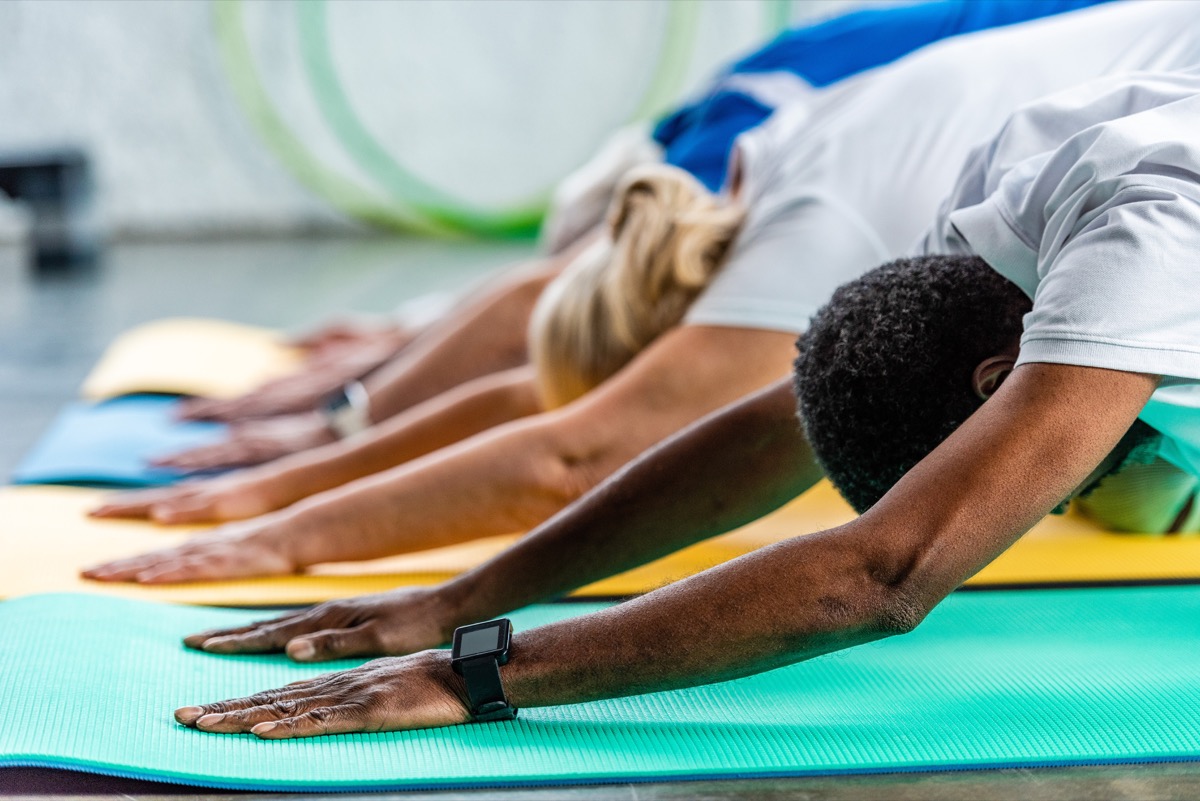
Even if you’ve never done a single downward dog pose, you should consider taking a few yoga classes if your sleep is suffering. In a 2012 survey conducted by the National Center for Complementary and Integrative Health, more than 55 percent of people who took yoga classes reported that they experienced improved sleep afterwards.
33
Limit your naps to just 20 minutes.
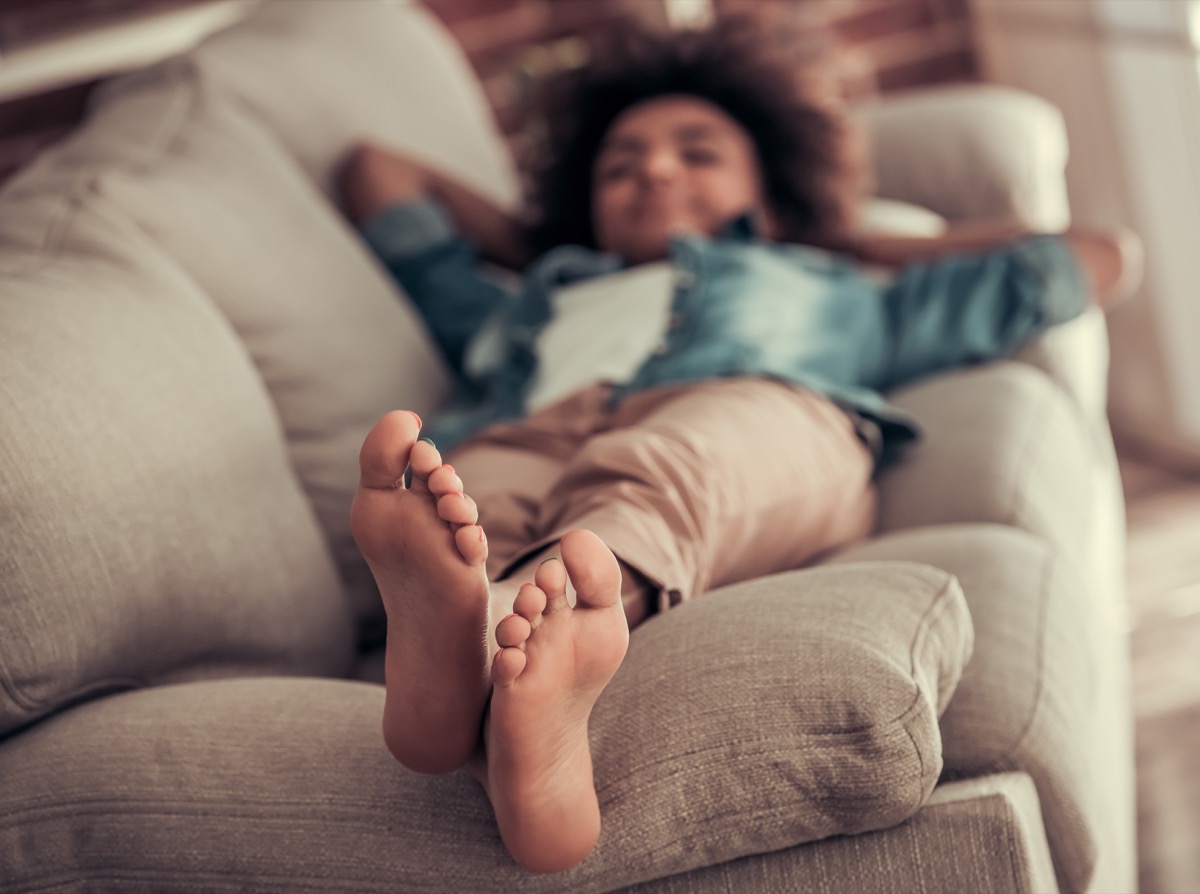
As you probably know from experience, oversleeping during a nap can end up sabotaging your nightly slumber. According to the Mayo Clinic, your naps shouldn’t stretch beyond 20 minutes. Anything longer than that can mess with your nighttime sleep, especially if you frequently deal with insomnia or poor sleep quality.
34
Slip into some socks.
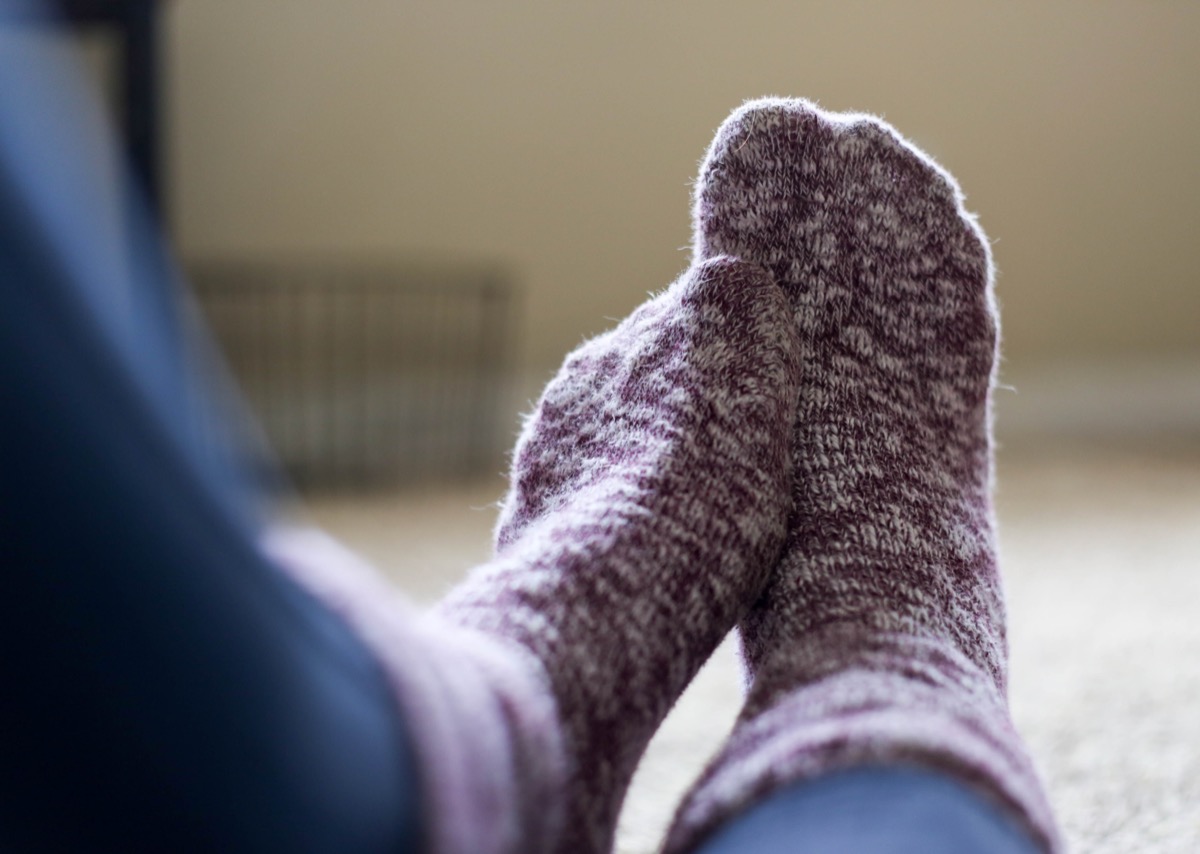
Wearing socks to bed is a surefire way to improve your sleep. According to one oft-cited 1999 study published in the journal Nature, “the degree of dilation of blood vessels in the skin of the hands and feet … is the best physiological predictor for the rapid onset of sleep.” To put that in layman’s terms: The warmer your feet are, the faster you’ll fall asleep.
35
Try progressive muscle relaxation.
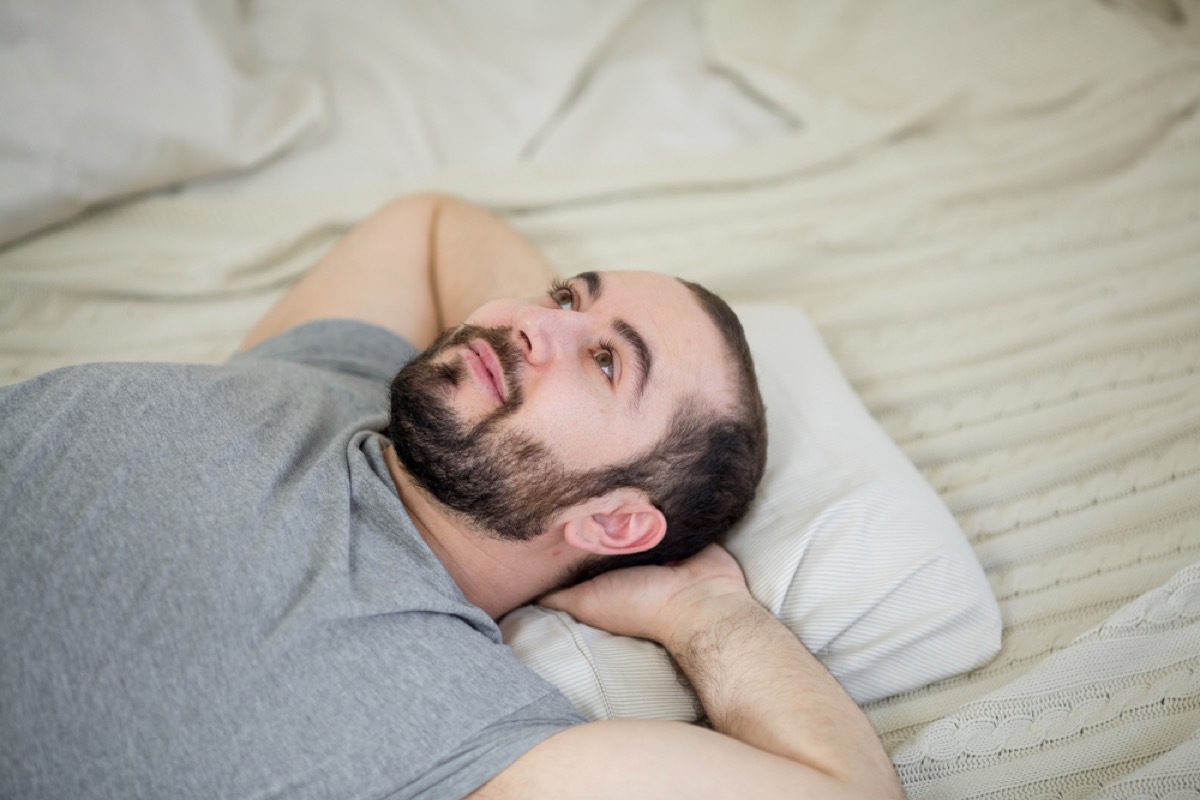
What’s “progressive muscle relaxation,” you ask? It’s just a fancy way of saying, when you lie down to go to bed, try focusing on each muscle group, tightening each for 10 seconds, then continuing on to the next group. Start with your feet, tightening the muscles in your toes, heels, etc. and count to 10. Then move your way up the body: Tighten the calves, the thighs, the glutes, the abs, all the way up until you reach the muscles in your face. “People who suffer from insomnia often report that practicing progressive muscle relaxation at night helps them fall asleep,” according to Melissa Stoppler, MD, of MedicineNet.
36
Stretch it out before you go to sleep.
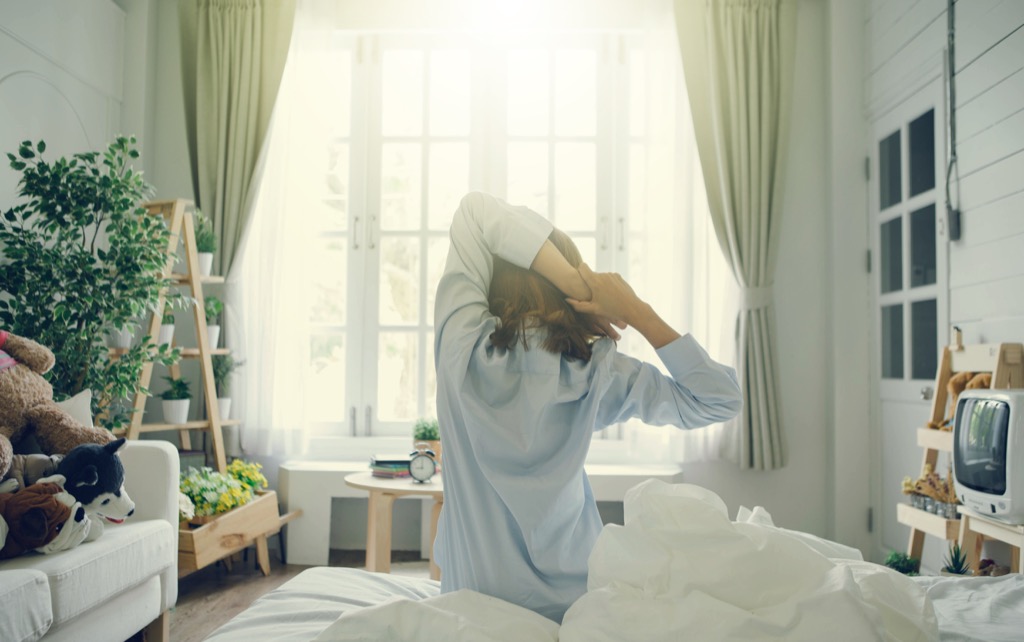
Our bodies tend to tense up and tighten as we age, so by doing a few stretches before going to sleep, you can avoid waking up in pain in the middle of the night. When Dutch researchers had adults over 55 partake in calf and hamstring stretches every night before bed for five weeks in a 2012 study, they found that participants experienced fewer leg cramps and therefore fewer sleep disturbances.
37
Express your gratitude.

It pays to be positive, especially if you’re trying to sleep better. When a team of researchers led by a professor at the University of California, San Diego, compared heart failure patients’ gratitude levels in 2015, they found that those who practiced gratitude slept better and were less tired throughout the day.
38
Fill your room with the scent of lavender.
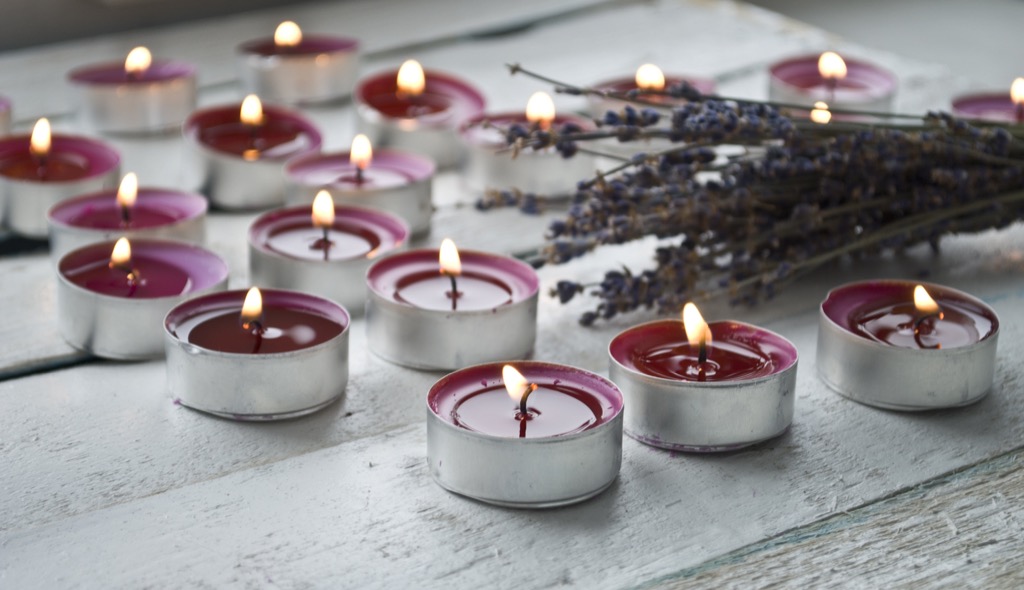
Whether you prefer candles or a diffuser, make sure you’re filling your room with the sweet scent of lavender right around bedtime. In one 2005 study published in The Journal of Biological and Medical Rhythm Research, researchers found that the scent of lavender promoted deeper, more restorative sleep in subjects.
39
Make reading part of your nightly routine.
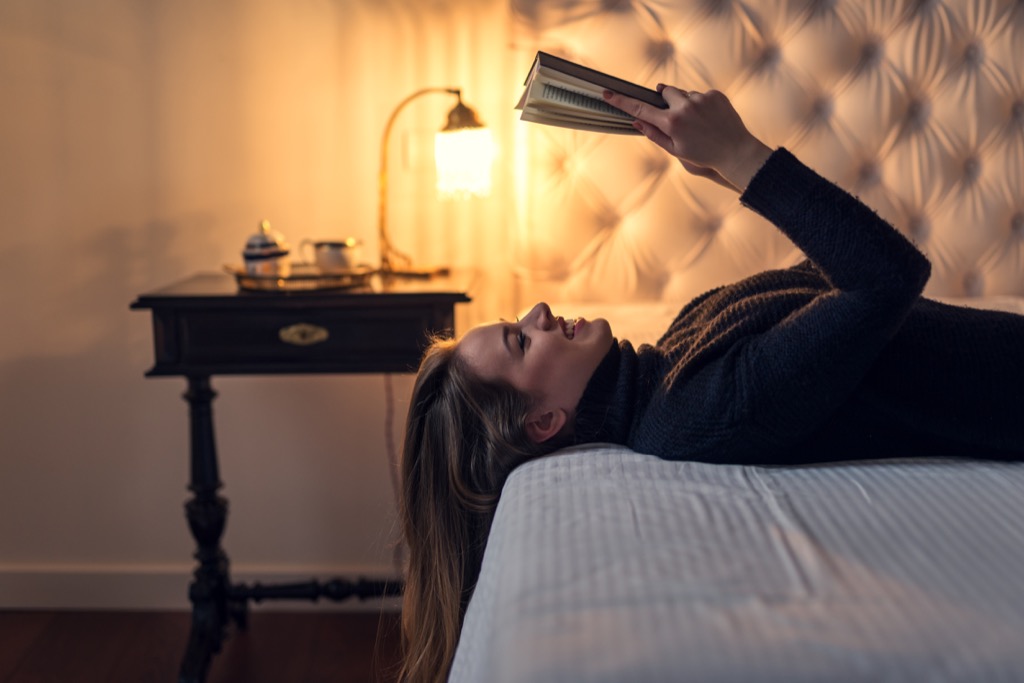
Whether you’re a fantasy fanatic or you prefer to revel in romance novels, try to indulge in a good book before bed every night. In one 2009 study from the University of Sussex, researchers found that reading reduced stress levels by 68 percent—and the less stressed you are, the easier it is to fall asleep.
40
Spend some time outside during the day.

If you want better sleep, make sure to soak up some daylight before the sun sets. In one oft-cited 1993 study from the Journal of the American Geriatrics Society, exposure to bright light during the day was associated with increased sleep time and overall improvements in age-related insomnia.
41
Eliminate any clutter in your bedroom.
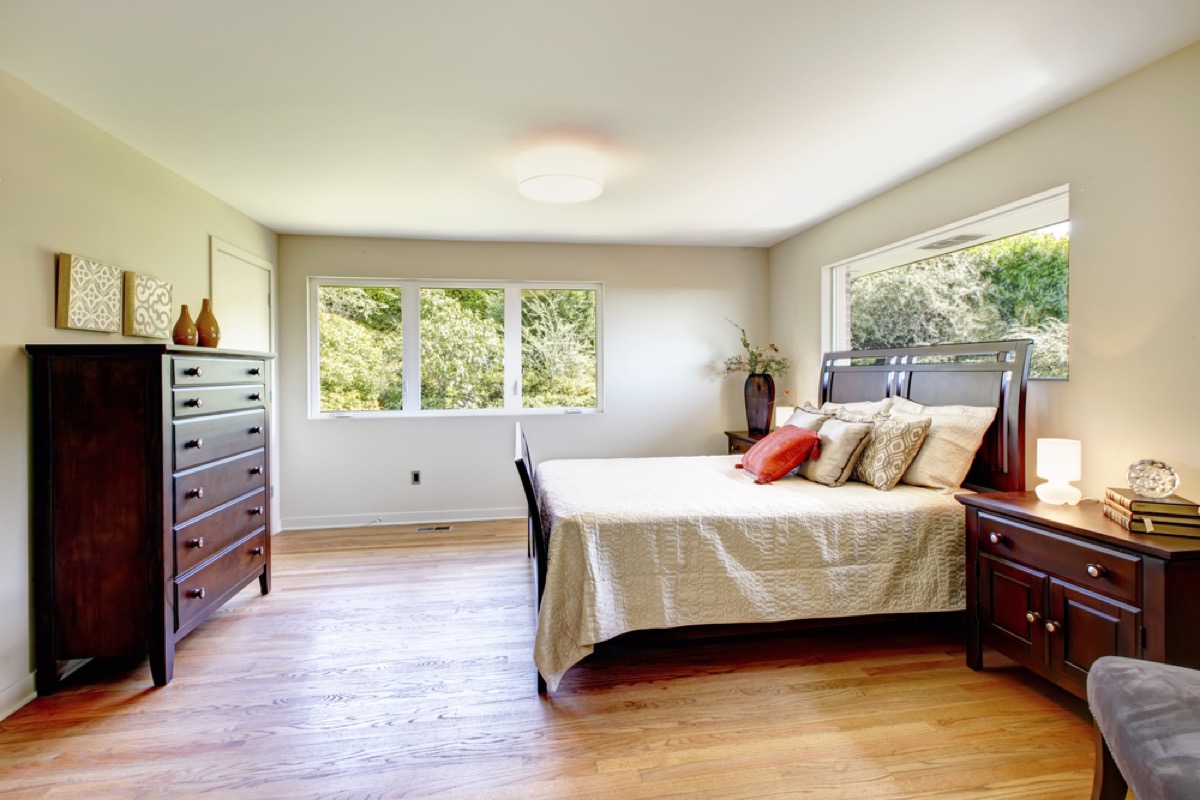
There are several reasons why you should keep your bedroom devoid of clutter—better sleep being one of them. Per one study presented at the 2015 meeting of the Associated Professional Sleep Societies, people at risk of hoarding disorder tend to experience more sleep disturbances and take longer to fall asleep.
“Hoarders typically have problems with decision making and executive function; poor sleep is known to compromise cognition generally, so if hoarders have cluttered/unusable bedrooms (and less comfortable, functional beds), any existing risk for cognitive dysfunction, depression, and stress may increase as sleep quality worsens,” lead author Pamela Thacher, assistant professor of psychology at St. Lawrence University, said in a statement.
42
And create a separate space for work outside of your bedroom.

Your bed (or your bedroom, for that matter) should not also moonlight as your workspace. Get that desk—and your laptop and your planner and all those cords—out of there and create a separate environment to work in. Once these lines are drawn, your body will know that when it’s in bed, it’s going to be rewarded with sleep.
43
Swap your mattress.
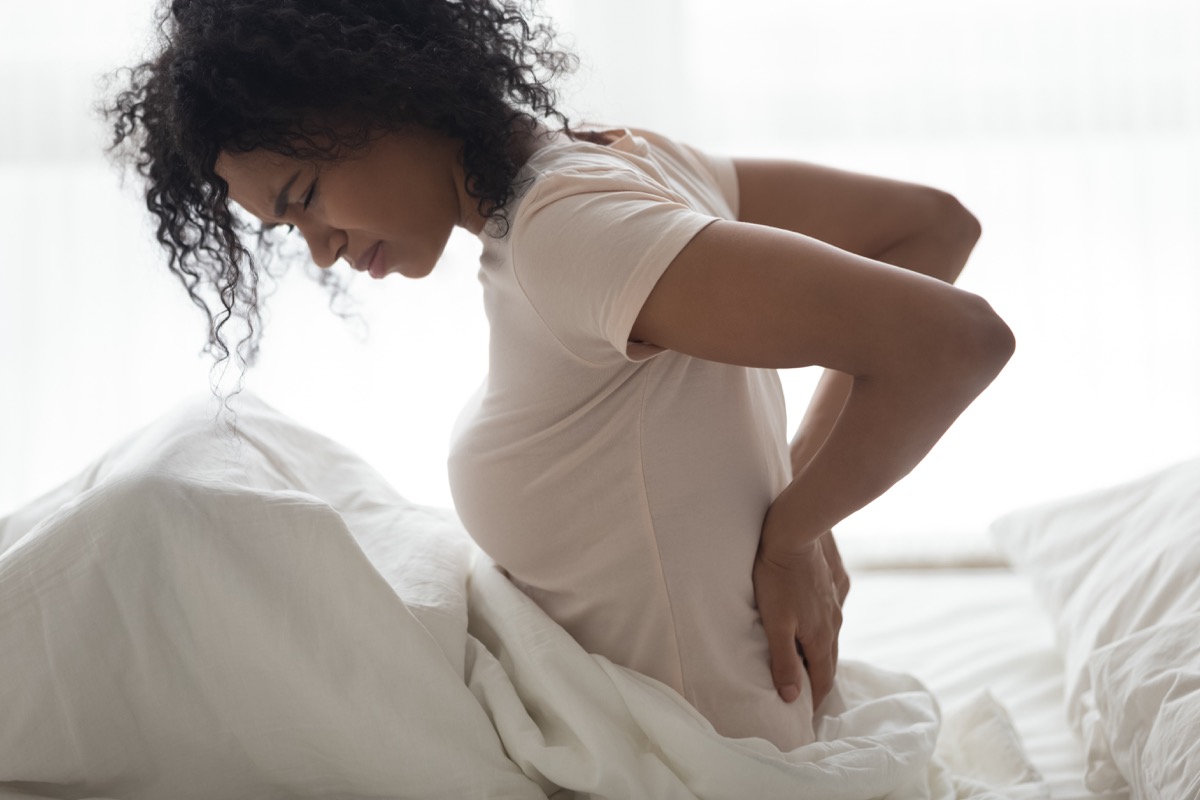
How long have you had your mattress? If you haven’t replaced it in a decade, you might want to consider getting a new one. According to the sleep professionals at Sleep Help, you should swap your mattress out every seven to ten years. By that point, the average mattress is saggy and worn out, so sleeping on it will leave you feeling uncomfortable, restless, and worst of all, in pain.
44
If you share a bed, get separate blankets.
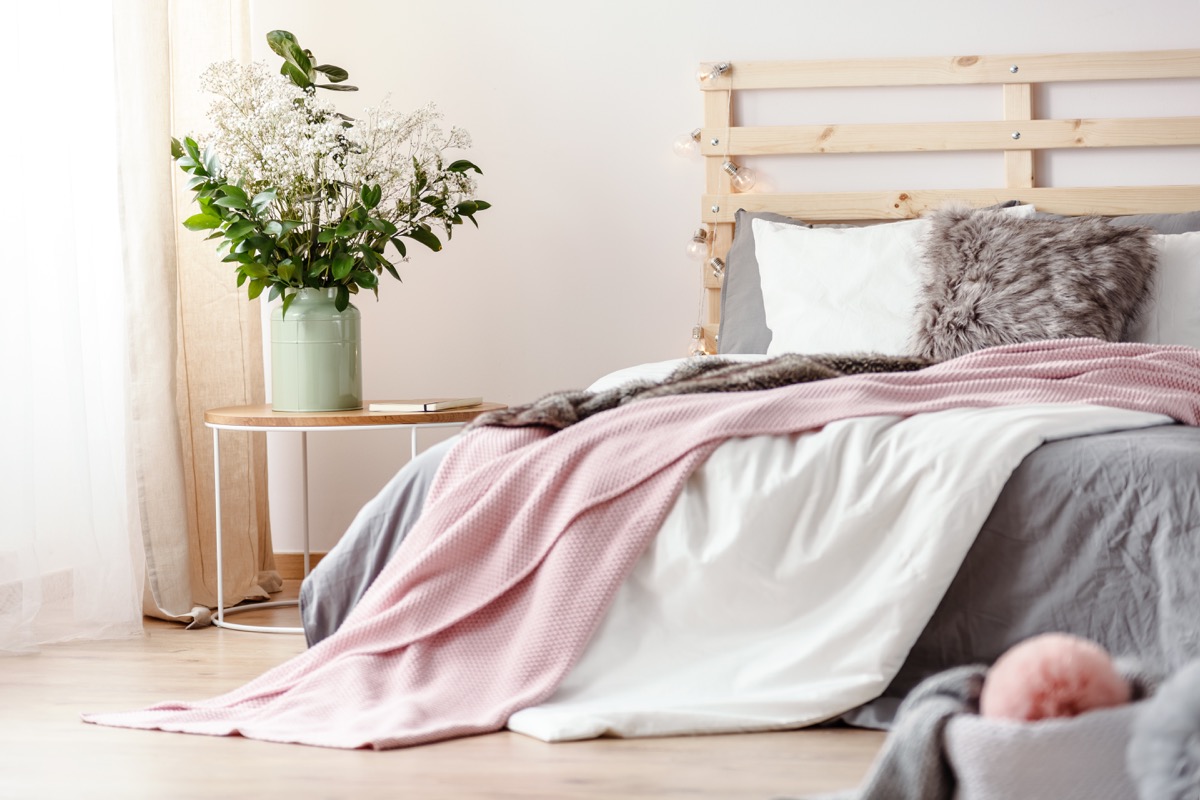
Do you toss and turn at night because your partner is a blanket hog? If that’s the case, you’ll sleep better simply by investing in a second blanket—one for each body. If you’re worried about this looking strange, you can cover the two blankets up with a single comforter. Problem solved!
45
Avoid checking your emails beyond work hours.
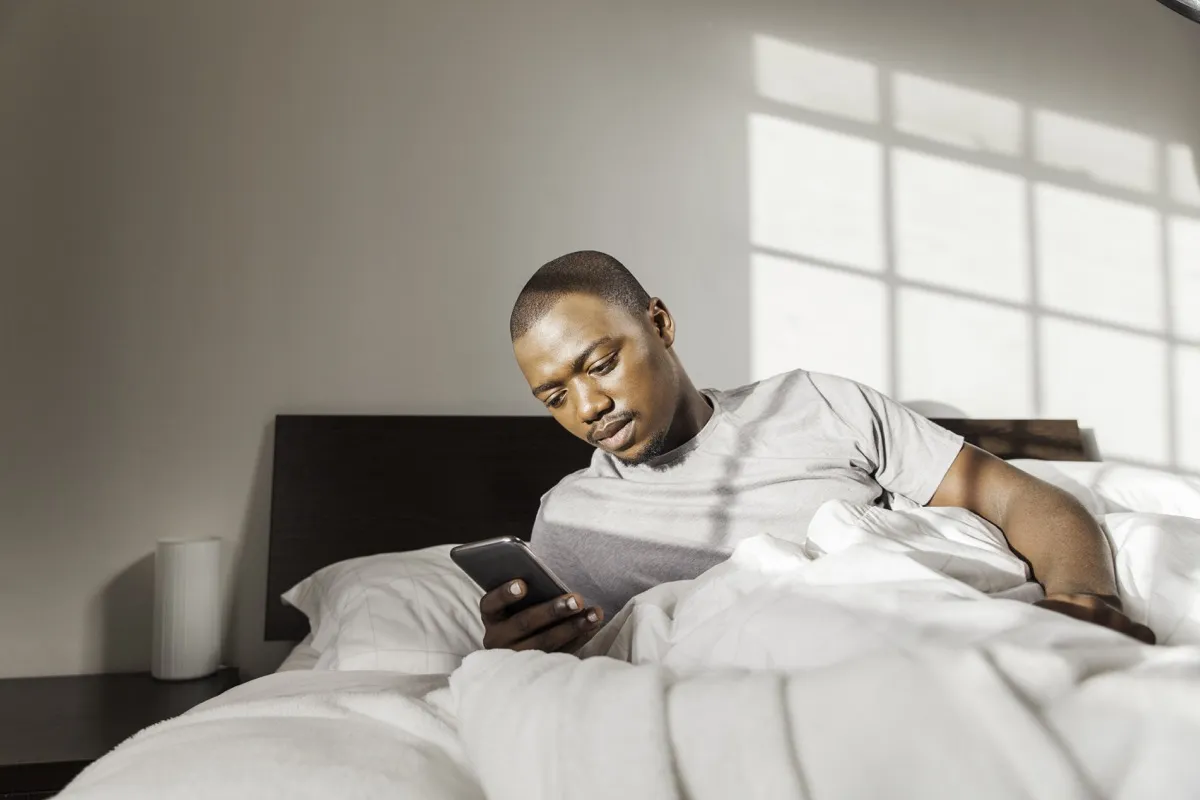
It can be tempting to check your emails after you’ve left the office or before you’ve even gotten there in the morning. However, your health and happiness will seriously benefit from you shutting off and shutting down outside of work hours.
And when we say shutting down, we mean forgetting about work altogether: One 2018 study from Virginia Tech found that so much as thinking about checking those emails can increase stress levels and thereby get in the way of your precious zzz’s.
46
And keep electronics out of the bedroom entirely.
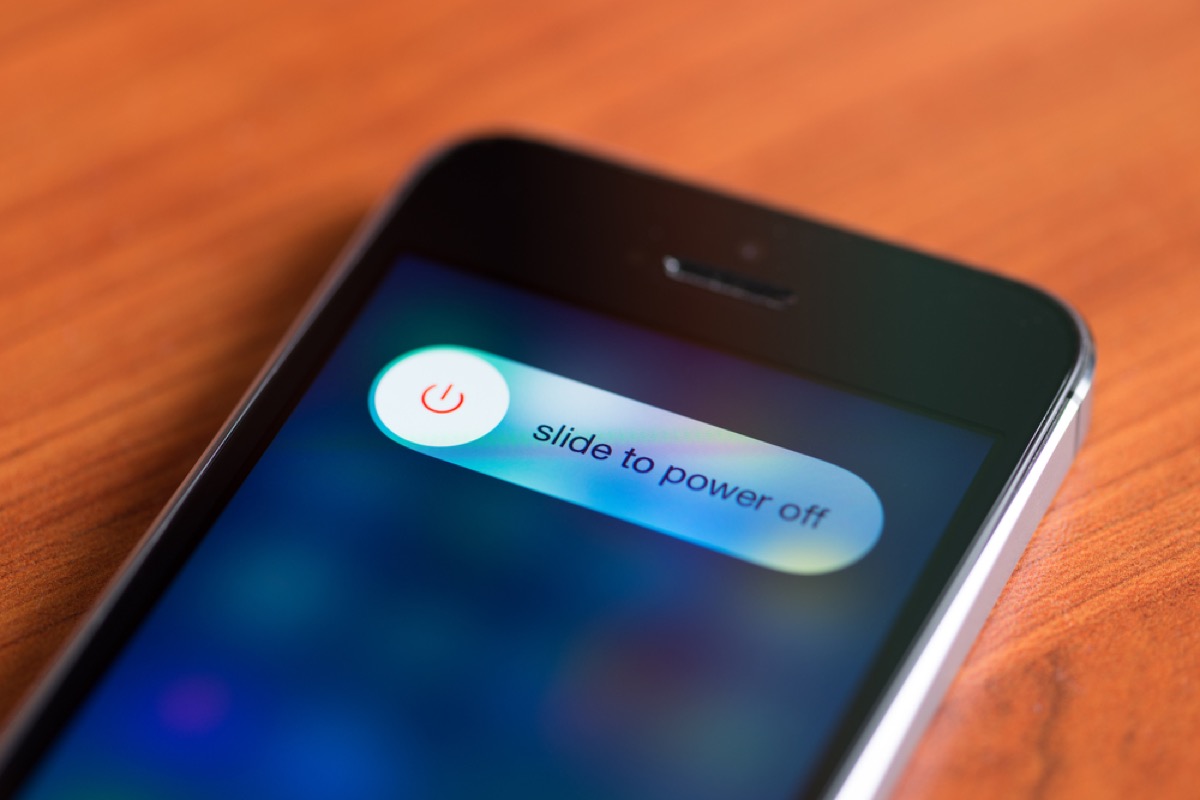
Try not to fall asleep while scrolling through Instagram or while catching up on your favorite Netflix series either. Though it can be tempting to use your electronics until the second you drift off, one 2012 study from Rensselaer Polytechnic Institute found that spending two hours on devices with backlit displays suppressed melatonin by approximately 22 percent, thereby making it harder to fall asleep.
47
When you struggle to fall asleep, think about staying awake.
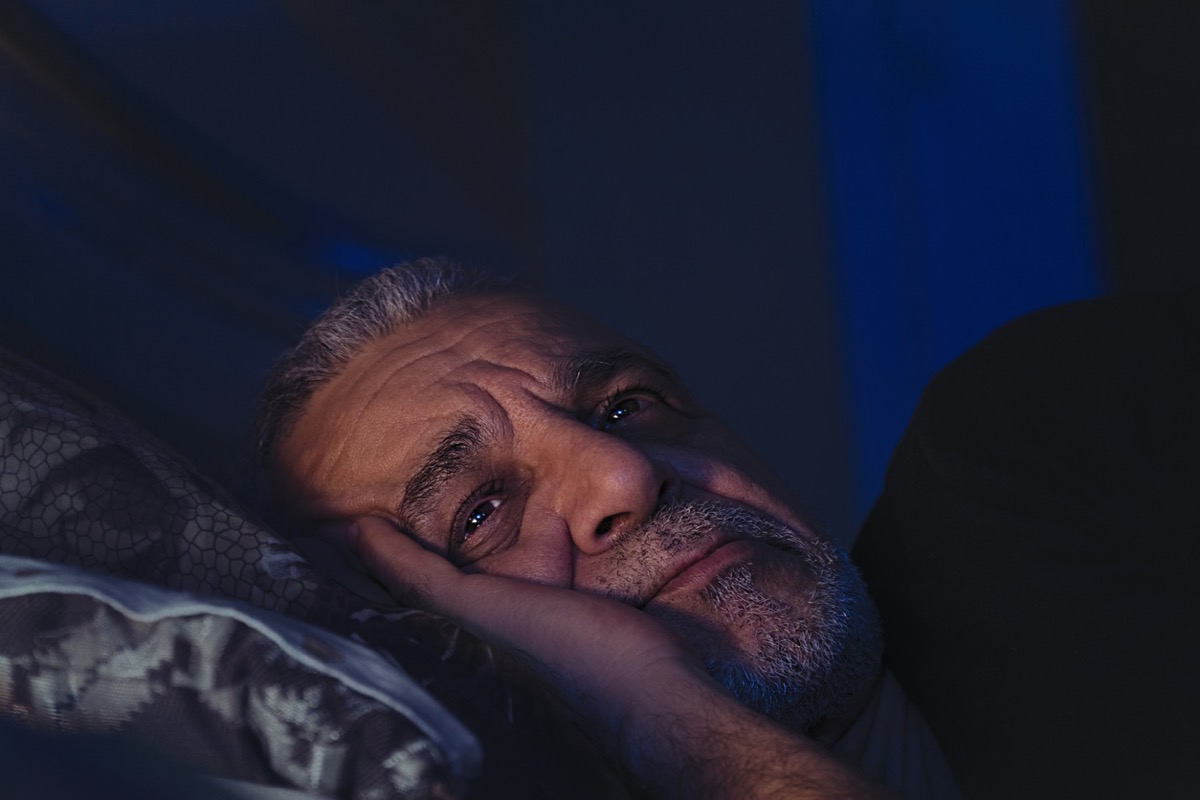
This advice might sound counterintuitive, but as Colin Espie, a professor of sleep medicine at the University of Oxford, told CNN, it works. “If you can be comfortable with the idea of remaining awake, then the performance anxiety and frustration that are associated with trying to sleep have nowhere to go and your arousal level drops,” he explained.
48
Try using an anxiety-relieving app.
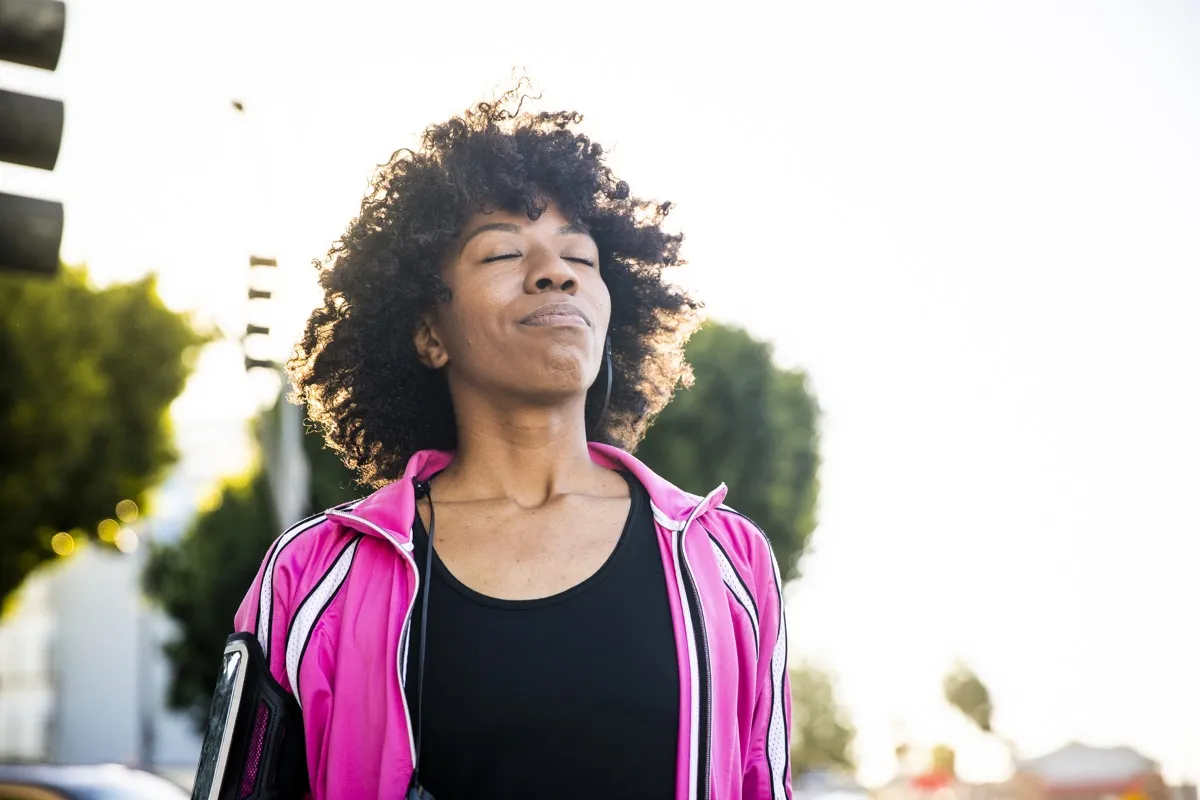
If your anxiety is what’s keeping you up at night, then a meditative app like Headspace or Calm might be what you need to sleep better. These guided meditation apps, though they each take a different approach to anxiety and stress relief, are designed to ease your mind and eliminate any thoughts that are preventing you from dozing off.
49
Take melatonin—just not too much.

Though your body produces melatonin naturally, it’s also sold as an over-the-counter supplement, and you can use it to fall asleep faster. Just be sure not to take too much: As the National Sleep Foundation notes, taking too much melatonin can cause headaches, nausea, dizziness, and irritation. Between two tenths of a milligram and five milligrams 60 minutes before you plan on going to sleep should do the trick!
50
Check your medications’ side effects.

Do you take beta-blockers for high blood pressure, or antidepressants like Prozac or Zoloft? One potential side effect of such medications is insomnia. So, if you’re having trouble sleeping, go over your prescriptions with your doctor to see if there’s anything that’s affecting your ability to get a good night’s sleep.